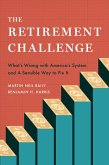Understanding the ways in which people save for their retirement is an urgent issue. So much has changed in the last 10 to 15 years, especially in the area of the provision of pensions and retirement income. Around the world, greater and greater responsibility is being allocated to individuals while governments discount their contributions to social security and employers retreat from the provision of supplementary retirement income. This book explores the behavioral revolution and its implications for understanding financial decision-making and saving for the future. Recognizing the profound implications of this research program, it goes beyond issues of risk aversion, framing, and decision-making to consider how social identity and the resources due to people by virtue of their place in society figure in savings behavior. It gives considerable attention to the context of the environment in which people make financial decisions, arguing that this allows a better understanding of the coexistence of sophistication and naivety apparent in patterns of retirement saving. Utilizing databases from the UK, the book provides an empirical foundation to its theoretical arguments, demonstrating how an integrated approach to individual financial decision-making is necessary if we are to address the apparent shortfall in many people's planning for the future. The book concludes by setting the agenda for the design, governance, and regulation of pension savings schemes consistent with delivering cost-effective solutions to pension adequacy. In these ways, it sets forth a strategy for rethinking individual behavior as well as the design of retirement income systems.
Dieser Download kann aus rechtlichen Gründen nur mit Rechnungsadresse in A, B, BG, CY, CZ, D, DK, EW, E, FIN, F, GR, HR, H, IRL, I, LT, L, LR, M, NL, PL, P, R, S, SLO, SK ausgeliefert werden.









